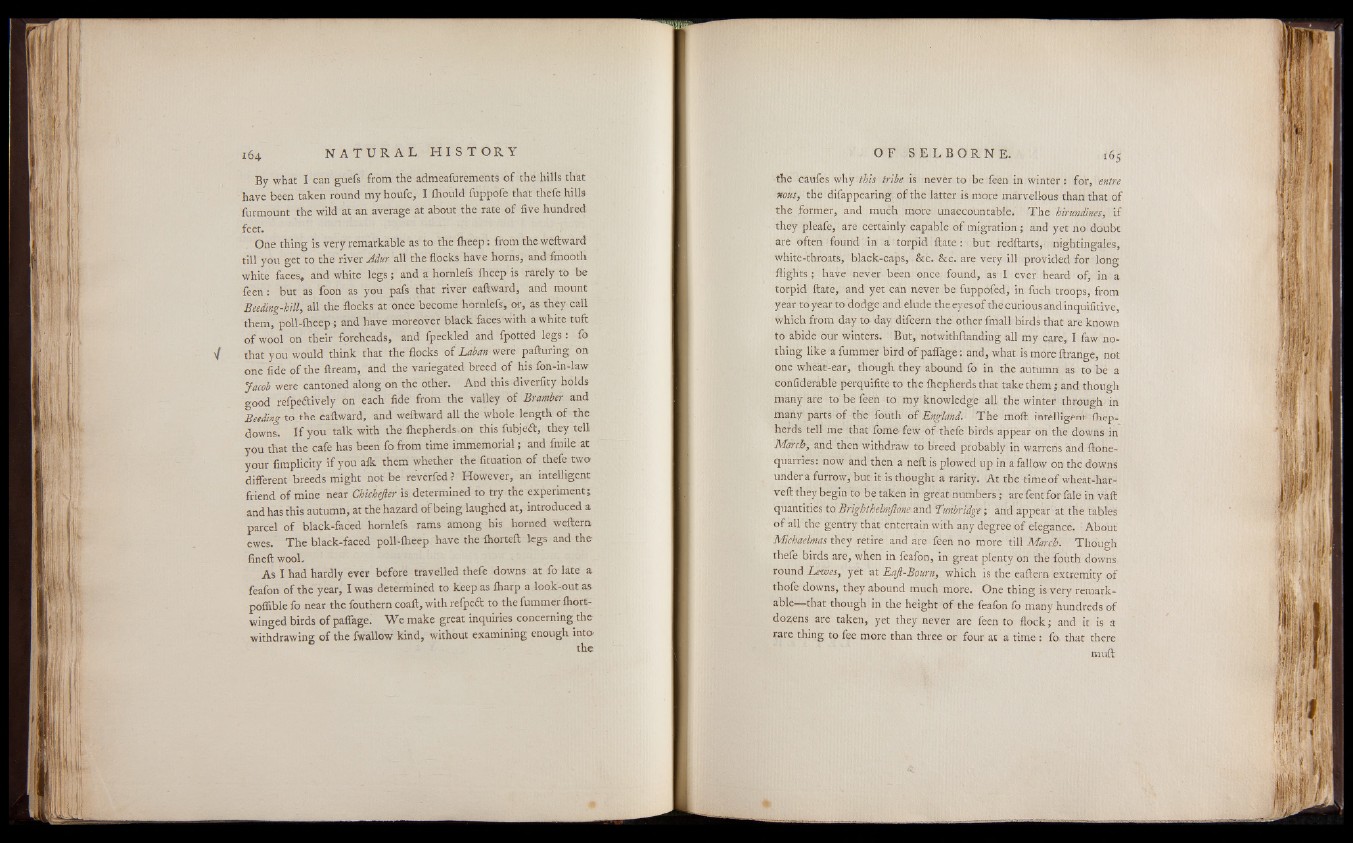
164
By what I can guefs from the admeafurements of the hills that
have been taken round my houfc, I fhould fuppofe that thefe hills
furmount the wild at an average at about the rate of five hundred
feet.
One thing is very remarkable as to the Iheep: from the weftward
till you get to the river Adur all the flocks have horns, and fmooth
white faces, and white legs; and a hornlefs Iheep is rarely to be
leen : but as loon as you pafs that river eaftward, and mount
Beeding-hill, all the flocks at once become hornlefs, or, as they call
them, poll-lheep ; and have moreover black faces-with a white tuft
of wool on their foreheads, and fpeckled and fpotted legs, fo
Y that you would think that the flocks of Laban were pafturing on
one fide of the ftream, and the variegated breed of his fon-in-law
Jacob were cantoned along on the other. And this diverfity holds
good refpeftively on each fide from the valley of Rramber and
Beetling to the eaftward, and weftward all the whole length of the
downs. I f you talk with the fhepherds on this fubjeft, they tell
you that the cafe has been fo from time immemorial; and fmile at
your fimplicity if you afk them whether the fituation of thefe two-
different breeds might not be reverfed ? However, an intelligent
friend of mine near Chkhefier is determined to try the experiment;
and has this autumn, at the hazard of being laughed at, introduced a
parcel of black-faced hornlefs rams among his horned weftern.
ewes. The black-faced poll-fheep have the fhorteft legs and the-
fineft wool.
As I had hardly ever before travelled thefe downs at fo late a
feafon of the year, I was determined to keep as lharp a look-out as
poflible fo near the fouthern coaft, with refpedt to the fummer fhott-
winged birds of paffage. We make great inquiries concerning the
withdrawing of the fwallow kind, without examining enough into
the caufes why this tribe is never to be feen in winter : for, entre
nous, the difappearing of the latter is more marvellous than that of
the former, and much more unaccountable, The hirundines, if
they pleafe, are certainly capable of migration; and yet no doubt
are often found in a torpid ftate : but redftarts, nightingales,
white-throats, black-caps, &c. &c. are very ill provided for long
flights ; have never been once found, as I ever heard of, in a
torpid ftate, and yet can never be fuppofed, in fuch troops, from
year to year to dodge and elude the eyes of the curious and inquifitive,
which from day to day difcern the other fmall birds that are known
to abide our winters. But, notwithftanding all my care, I faw nothing
like a fummer bird of paffage: and, what is more ftrange, not
one wheat-ear, though they abound fo in the autumn as to be a
confiderable perquifite to the fhepherds that take them; and though
many are to be feen to my knowledge all the winter through in
many parts of the fouth of England. The moft intelligent fhepherds
tell me that fome- few of thefe birds appear on the downs in
March, and then withdraw to breed probably in warrens and ftone-
quarries: now and then a neft is plowed up in a fallow on the downs
under a furrow, but it is thought a rarity. At the time of wheat-har-
veft they begin to be taken in great numbers; arefentforfale in vaft
quantities to Brighthelmjlone and Tunbridge; and appear at the tables
of all the gentry that entertain with any degree of elegance. About
Michaelmas they retire and are feen no more till March. Though
thefe birds are, when in feafon, in great plenty on the fouth downs
round Lewes, yet at Eafi-Bourn, which is the eaftern extremity of
thofe downs, they abound much more. One thing is very remarkable—
that though in the height of the feafon fo many hundreds of
dozens are taken, yet they never are feen to flock; and it is a
rare thing to fee more than three or four at a time : fo- that there
Draft